Devendra Banhart - Interview
by Anthony Dhanendran
published: 18 / 4 / 2003
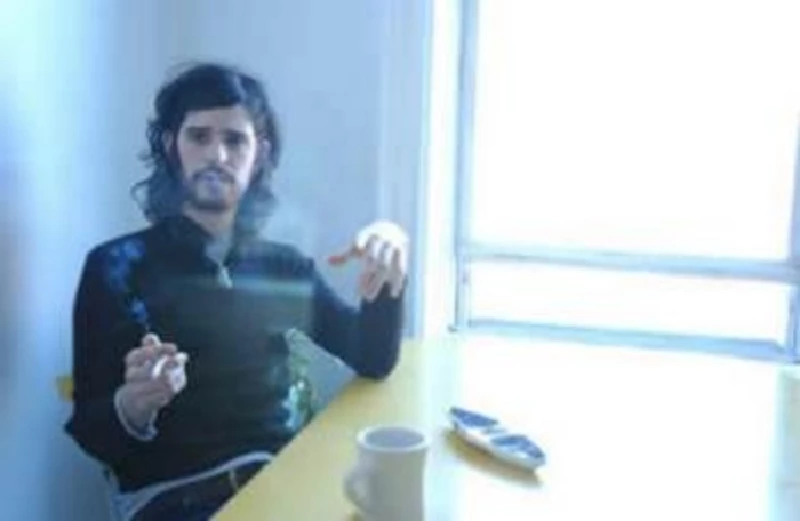
intro
Texan-born, but Venezuelan-raised folk artist Devendra Banhart has won acclaim in all quarters and recently a deal with former Swan Michael Gira's Young God label. Anthony Dhanendran talks to him about his schizophrenic take on pop
The Bush Hall is a very strange place to hold a gig. A mock-Baroque ballroom built for no apparent reason on the Uxbridge Road west of Shepherd’s Bush, and later converted into a snooker hall, it was recently reconverted into a music venue. On some nights, you can still see queues of confused West London punters brandishing snooker cues and wondering where their club’s gone. It all adds to the air of mystery. But then Devendra Banhart is probably just the right musician for such a venue. His album, 'Oh Me Oh My…', is a fascinating collection of musical odds and ends, recorded on the cheapest equipment and released without fuss on Young God records, the label run by Michael Gira (Angels of Light). Banhart is supporting Gira tonight on a (very) short tour of Europe. Born in 1981 in Texas, he moved to Caracas (Venezuela) with his family while still young, and then lived in San Francisco, Los Angeles and Paris, before moving to New York, where he lives now. The Bush Hall date is Banhart’s first London gig. Pennyblackmusic popped into his dressing room beforehand for a few words. PB: How are you feeling at the moment? Are you well? DB: I’m feeling OK, a little shell-like. PB: So just three days here? Is it a promotional thing? DB: I guess so, I guess the reason that anyone plays is to promote themselves, in a way. Although I don’t look at it that way, ‘cos I love playing. And it’s an opportunity to come to Europe. I guess we were just asked specifically to do this – Michael [Gira]’s record just came out, and it’s a solo thing. And it’s before we start practising with Angels of Light [Gira’s band, now including Banhart]. The minute we get back, which is tomorrow we start practising seven hours a day, ‘til the 27th, and then we go on tour, which I’ll be opening. I’m also gonna be in the Angels of Light. That’s like a full band thing, and that’s really his focus. So this is more like a solo venture. What I do has always been a solo venture. PB: And you’re going to continue recording solo? DB: Yeah. Yeah, definitely. PB: The album is all demos, isn’t it? DB: Yeah, I guess so. It was recorded on the most rudimentary equipment I could find. So I guess that would be a demo. It wasn’t made to be, like, this demonstration of what I can do, it was just, “this is what I have access to.” So I think that’s what that record is. It was definitely not made for all the people that have heard it here, but I’m glad they have. PB: Didn’t you want to re-record it? DB: I wasn’t even thinking about labels. But I like Michael’s music well enough, and hiswell label enough, that I said, “Sure, you can release it.” And he was wondering maybe we should re-record it. And I was into that, but we decided in the end to just not do that, and that’s fine with me as well. I haven’t even heard the record from start to finish – I can’t really put up with myself for that long. PB: You play with quite a selection of bands… DB: Not really, not that much: Vetiver, who started off as this man Andy Cabic who was once in a band called the Raymond Brake, which had a record out on Simple Machines records; I play in the Angels of Light; and a band called the Black Babies, although it’s very hard to get the group to actually play together, because some people live in Baltimore, some live in Los Angeles, some in San Francisco, and I live in New York. But when we are together, we’re the Black Babies. PB: Do you find you play a different style of music with the Black Babies? DB: It sounds like my music trying to sound like Bo Diddley. PB: Whereabouts do you live at the moment? DB: I live in Michael’s basement. In New York City, in Brooklyn. PB: One of the many things your album reminded me of is the antifolk music coming out of New York at the moment… DB: Well, that’s a whole scene, that’s really happening in New York, at the Sidewalk and everything I really have no association with it, I never go to the Sidewalk, I never play at the Sidewalk. But there are two people that are good friends of mine, whose work I really admire. And they’re both people that I like as people, and I really admire their music but I definitely have no association with the antifolk scene or have any interest in being part of it. PB: What kind of crowds do you play to in New York? DB: Michael? MG: [who has just walked in, wearing a suit of sorts and brandishing a fedora that Sinatra would have killed for] He gets big crowds. DB: Yeah, but what kind of crowd? MG: What kind of crowd? Very mixed. I mean, my girlfriend’s mother loves him. My friends who like experimental noise music love him. He seems to be loved by everybody. Because you feel like you can slap him around. DB: I guess that’s what it is. Yeah… PB : Do you feel comfortable with that, being slapped around ? DB: I’ll tell you what, man, I get so much weird shit like people hear the record and they dig it. Then they see the pictures on the website and they just assume that Michael writes all my lyrics, writes all the music. Shit like that, a lot of weird shit. Anyways, it’s a good crowd, good people. PB: You do seem a lot more, er, composed than on the album and in the pictures. DB: I’m really relaxed right now. Is that okay? I think that’s a good thing. I mean, you don’t wanna deal with… I’m glad to be relaxed. PB: Do you take on a different personality when you’re on stage and when you’re performing? DB: No, I don’t. It’s just that right now I’m saying “right now” and I’m saying “I’m saying”, it’s just regular words, you’re just talking. But when you sing certain words they evoke certain things in you and they awaken certain things in you. And it gets a little more emotionally involving than just saying, “Yeah, I have a pair of shoes, I sure like shoes.” You know? So that’s how it is. PB: The reviews of the album have been pretty good. Were you surprised that people dug what you’re doing? DB: Yeah. PB: Are you still surprised? DB: Definitely. I’m not even at the point that I’m saying I’m comfortable being a musician. I don’t think I’m a very good guitar player, I don’t think I’m… I don’t know, I don’t really know, man. I mean, I feel weird about everything. All I’ve known before this was bussing tables, clearing up dirty toothpicks, washing the floor, cleaning dirty toilets, that kind of thing. So this is just a weird, weird, weird fucking foggy haze. It’s cool, though. PB: How long ago did you give your stuff to Michael to put the album together ? DB: I gave Michael 54 songs in, er, I think May. Last May. And then we chose the songs and then it takes a while for the record to come out. So the record came out October 28th. I don’t know how long it’s been since then, but I just finished a six-week tour – the first tour I’ve ever done – playing every night. PB: What was that like ? DB: Incredible. Every single night was totally far out, totally different. I have so many far out stories. But you can’t record them. There were four of us, and we all turned into the collective mind, where we’d be like, “Are we hungry, are we tired?” And then it got to the point where we weren’t asking each other questions any more. And also, we had so much weed, we had so much acid, we had so many mushrooms, that at one point none of them mattered at all. None of them affected us whatsoever, and we’d just, the way we’d been living, which was basically hustling. Every show, we had to hustle ourway to get an apartment. We had to hustle our money because people didn’t want to pay us. That kind of thing, it was a really really rough but incredible tour that was done in the middle of Winter. PB: So what kind of venues were you playing ? DB: We went from record store basements and church basements to huge rock clubs and at all of them we had a really really good crowd. But I can’t generalise it. That was from New York City out to California, and back to New York City, and playing every city in between. PB: Do you find it weird that people in LA, or people over here, are into what you’re doing in New York ? DB: I don’t know. I don’t think people are different in Europe, I think people are people. That’s all. PB: Are you doing a lot of promotional stuff while you’re over here? DB: I guess so. MG: We did some radio. DB: Yeah, today I did, er, K, no, what is it, XFM? And I did the BBC with, er, that guy from Iron Maiden? PB: [incredulously] Bruce Dickinson [former Maiden singer who has a show on BBC 6 Music]? DB: Yeah, Bruce Dickinson. But I’ve never heard an Iron Maiden song, so I wasn’t really nervous, but everyone else was like, “He’s from Iron Maiden!” What is an Iron Maiden song? MG: It’s… metal. [At this point the conversation meanders into the details of the tour, and it transpires that Devendra has to be up at 7.30 the following morning. He is not amused.] PB: So there’s no hustling on this tour, then? DB: Oh no, this is very much better. Very nice, very very nice. Shit, though, I didn’t know we had to do that. MG: Yes we do. Get up at 7.30, get a cab at 8.30, get to Victoria at 9.00, get a train at 9.30, be there at 10.00… DB: The rock and roll lifestyle! At least we know what airport we’re going to. We once had an itinerary telling us to go to Heathrow when we were supposed to be at Gatwick. MG: I double-checked it. The crowd are starting to come into the venue, so PB leaves them to fret over their travel plans. But not before Devendra has a chance to tell PB of his current favourite listening: ethereal 60s boho-folk waif Vashti Bunyan (“listen to her and Nick Drake, and be glad that she’s still alive”). Devendra Banhart is touring the UK in September.
Picture Gallery:-
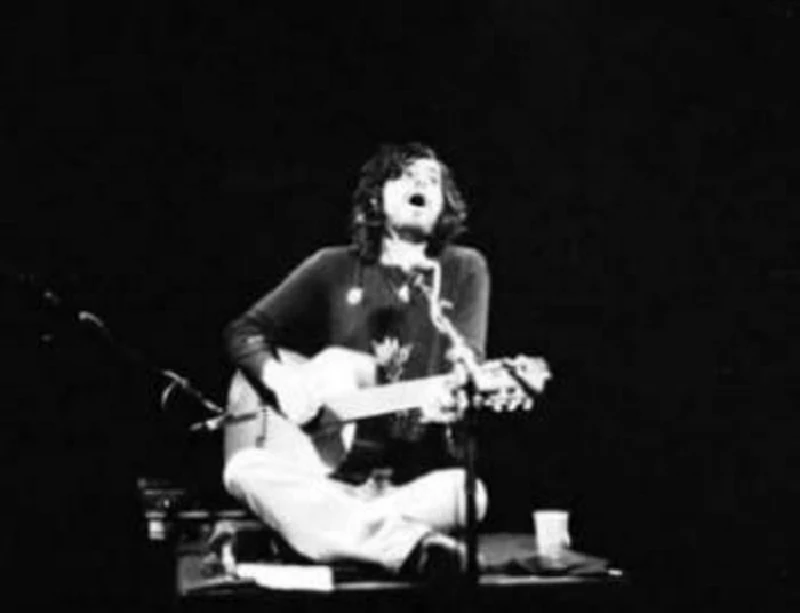
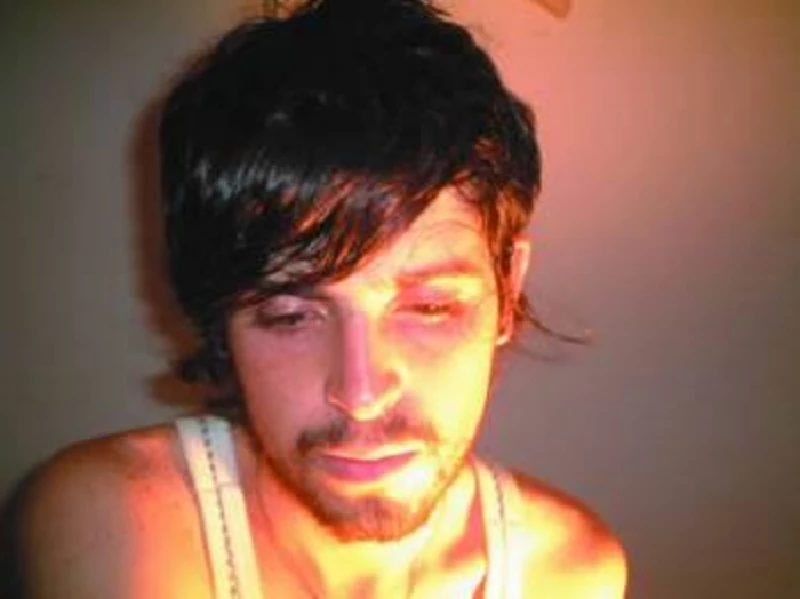
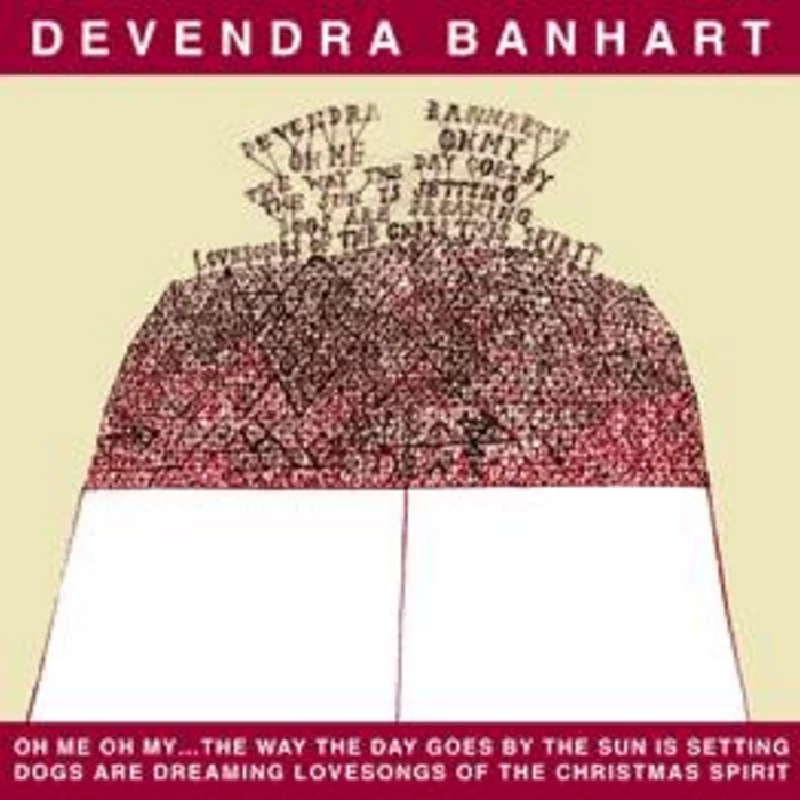
interviews |
|
Interview (2005) |

|
| At a press conference in Regent's Park, folk star Devendra Banhart and his band chatted to journalists and music writers about thir new album 'Cripple Crow.' Mark Rowland reports back on a very unusual evening |
live reviews |
|
Academy 2, Manchester, 15/9/2006 |
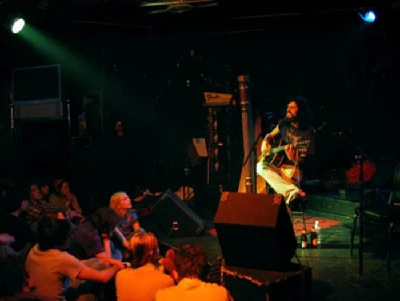
|
| In the over hot atmosphere of Manchester's Academy 2, Helen Tipping enjoys watching off the wall folk artist Devendra Banhart play a relaxed and laid back set |
reviews |
|
Cripple Crow (2005) |
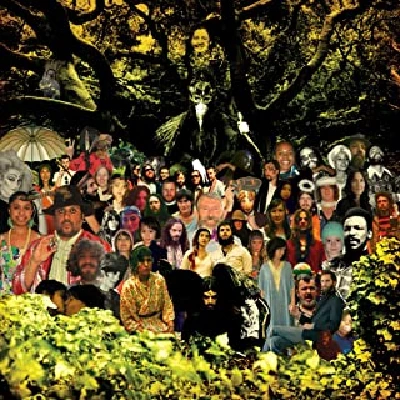
|
| Largely acoustic fifth album from distinctive, quirky Los Angeles based troubadour Devendra Banhart, which finds him moving away from home recordings and venturing for the first time into a proper recording studio |
| Rejoicing In The Hands (2004) |
| Black Babies (2003) |
| Oh Me Oh My... (2003) |
most viewed articles
current edition
Carl Ewens - David Bowie 1964 to 1982 On Track: Every Album, Every SongEditorial - July 2025
Billie Eilish - O2 Arena, London, 10/7/2025
Bathers - Photoscapes 2
Bathers - Photoscapes 1
Hothouse Flowers - Photoscapes
John McKay - Interview
Cleo Laine - 1927-2025
Simian Life - Interview
the black watch - Interview
previous editions
Heavenly - P.U.N.K. Girl EPTrudie Myerscough-Harris - Interview
Pixies - Ten Songs That Made Me Love...
Boomtown Rats - Ten Songs That Made Me Love....
Fall - Hex Enduction Hour
Beautiful South - Ten Songs That Made Me Love...
Love - Interview
Bram Tchaikovsky - Profile
Blues and Gospel Train - Manchester, 7th May 1964
Peter Paul and Mary - Interview with Peter Yarrow
most viewed reviews
current edition
Sick Man of Europe - The Sick Man of EuropeAmy Macdonald - Is This What You've Been Waiting For?
Phew, Erika Kobayashi,, Dieter Moebius - Radium Girls
Alice Cooper - The Revenge of Alice Cooper
Blueboy - 2
Lucy Spraggan - Other Sides of the Moon
Cynthia Erivo - I Forgive You
Bush - I Beat Loneliness
Davey Woodward - Mumbo in the Jumbo
Philip Jeays - Victoria
Pennyblackmusic Regular Contributors
Adrian Janes
Amanda J. Window
Andrew Twambley
Anthony Dhanendran
Benjamin Howarth
Cila Warncke
Daniel Cressey
Darren Aston
Dastardly
Dave Goodwin
Denzil Watson
Dominic B. Simpson
Eoghan Lyng
Fiona Hutchings
Harry Sherriff
Helen Tipping
Jamie Rowland
John Clarkson
Julie Cruickshank
Kimberly Bright
Lisa Torem
Maarten Schiethart